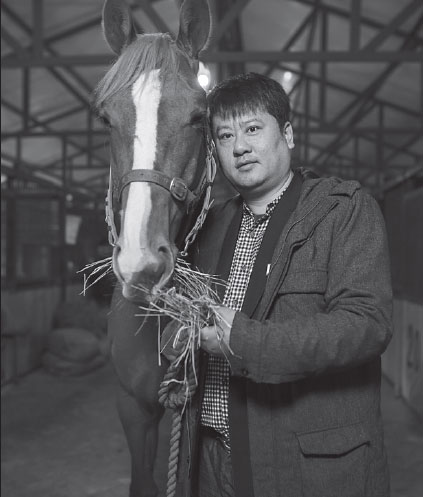 |
|
Lang Lin checks on his horses every day. He owns more than 800 of them. [Photo/China Daily] |
"We found it's a niche market, but this model can only work in China, because it is an emerging industry, and there is lots of room for growth potential at each link of the industry," he said while greeting the company's jockeys as they arrived.
But like many equestrian clubs, the company is also looking for members and patrons who can afford to buy horses and board them at the company's stables. On average, the club horses, purchased mainly from breeders in New Zealand, cost around $20,000 each, with monthly boarding expenses coming in at about 3,000 yuan.
Polo players at Rider Horse insist that this is not the new arrival of polo in China but a kind of renascence, as the link to horse riding goes back to the Tang Dynasty, 1,000 years ago.
There's a saying among the Mongols that "the nomad is born in the saddle," and many do seem to be born riders in Inner Mongolia, home to the best Mongolian horses in China. It is also one of the reasons that Lang located his company on the Khorchin prairie.
"The game will come back in fashion again, alongside golf and wine, since we had such a good culture in China," Lang said.
The horse industry has generated revenue of $39 billion annually in the US, and it has a $102 billion impact on the US economy when the multiplier effect of spending by industry suppliers and employees is taken into account, according to the United States Equestrian Federation.
 |
| Rules and betting seen as fast track to Chinese clubs' success |
 |
| Sport of kings a lure for nouveau riche |
Compared with the US, China's horse industry accounts for but a fraction of the nation's total economic volume. But Lang said it is only a matter of time before China catches up with the traditional horse-riding markets, especially if China lifts its ban on wagering on horses in the future.
But Pan Bingyou, a former executive at the Hong Kong Jockey Club, said that although many horse companies are running test races, he expects there to be no betting on horses in the foreseeable future.
"Football lotteries are allowed now in China, so I see no reason why a horse-betting event can't happen in China," Pan added. "If approved, an estimated 3 million jobs could be created."
Annual lottery sales could reach 100 billion yuan, with 40 billion yuan in tax revenue annually, according to Qin Zunwen of the Hubei Provincial Academy of Social Sciences.
But he said that as the horse industry expands, the demand for professional horse trainers, riders, farriers and horse veterinarians will rise accordingly, which will likely become a bottleneck for the industry.
In Lang's club, an experienced farrier who has been shoeing horses in Macao for decades earns approximately 300,000 yuan a year, nearly five times higher than the average income in big cities like Beijing.
